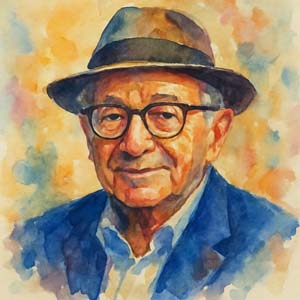 A maker of film miracles, writer-director Billy Wilder was born Samuel Wilder (1906–2002) in Sucha, Austria and nicknamed after wild west hero Buffalo Bill.
A maker of film miracles, writer-director Billy Wilder was born Samuel Wilder (1906–2002) in Sucha, Austria and nicknamed after wild west hero Buffalo Bill.
“You have to have a dream so you can get up in the morning,” he once said.
Wilder fled Nazi Germany in 1934 and arrived in Hollywood with no money, but a heart full of dreams. He learned English by listening to baseball on the radio and going to movies.
He was first a successful screenwriter with Charles Brackett before directing his first film, *The Major and the Minor*, in 1942. He followed that with *Double Indemnity* (1944), written with Raymond Chandler.
“Making movies is a little like walking into a dark room,” he explained. “Some people stumble across furniture, others break their legs, but some of us see better in the dark than others.”
Wilder won six Academy Awards, including two for writing and directing *The Lost Weekend* (1945), one for writing *Sunset Boulevard* (1950), and three for producing, writing, and directing *The Apartment* (1960) with Jack Lemmon.
“Hindsight is always twenty-twenty,” he once said. His other classics include *Some Like It Hot* (1959) with Marilyn Monroe and *Sabrina* (1954) with Audrey Hepburn.
Actors loved working with him. “I thought Billy Wilder was a god,” said Walter Matthau. Director Cameron Crowe praised, “His movies are a worldwide language of love, intelligence, and sparkling wit.”
Known for his wit, Wilder once joked that an associate producer was “the only guy who will associate with a producer.” But with humor came humility: “I just made pictures I would've liked to see,” he said. Truth from a man who poured his soul into every frame, leaving us a legacy for the heart.
 Believe in miracles.🎬✨
Believe in miracles.🎬✨
